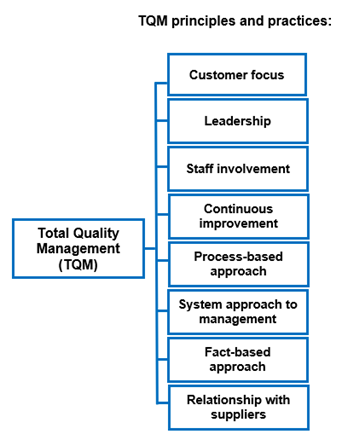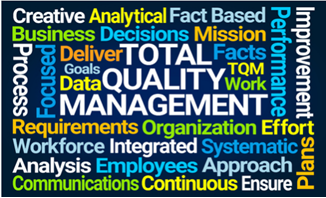- Home
- Continuous Improvement Certification Online
- Significance of Total Quality Management
Significance of Total Quality Management
Significance of Total Quality Management: SURVIVAL AND SUCCESS

The significance of Total Quality Management is due to the organizations that want to survive and be successful, in competitive and globalized environments, which are faced with the need to efficiently achieve their objectives and results. For this, they design and implement management systems, which allow them to establish policies and responsibilities, assign resources and identify and develop key activities, that is where TQM is a strategic factor.
Total Quality Management is a strategic approach that focuses on fostering a continuous flow of progressive quality improvements. It encourages the establishment of a culture of collaboration between the different departments within the organization. It is primarily a cultural initiative and a management style towards higher quality.
TQM maintains as its axis the vision and mission defined by a company since it is based on this concept, being the correct determination of objectives and goals the first step to guide the company and its method of solving problems.
TQM is one of the foundations of Lean Manufacturing, initially it contributed with its approach to implementing a collective business culture of total commitment to efficiency.
Advantages of Total Quality Management include:

- Cost reduction: When applied consistently over time, TQM can reduce costs throughout an organization, especially in the areas of scrap, rework, field service, and warranty cost reduction. Since these cost reductions flow straight through to bottom-line profits without any additional costs being incurred, there can be a startling increase in profitability.
- Productivity improvement: Productivity increases significantly, since employees are spending much less of their time chasing down and correcting errors. Increased productivity means more output per employee, which typically results in increased profits.
- Customer satisfaction: Since the company has better products and services, and its interactions with customers are relatively error-free, there should be fewer customer complaints. Fewer complaints may also mean that the resources devoted to customer service can be reduced. A higher level of customer satisfaction may also lead to increased market share, as existing customers act on the company's behalf to bring in more customers.
- Defect reduction: TQM has a strong emphasis on improving quality within a process, rather than inspecting quality into a process. This not only reduces the time needed to fix errors, but makes it less necessary to employ a team of quality assurance personnel.
- Morale: The ongoing and proven success of TQM, and in particular the participation of employees in that success can lead to a noticeable improvement in employee morale, which in turn reduces employee turnover, and therefore reduces the cost of hiring and training new employees.
Where to Implement Total Quality Management?

TQM works best in an environment where it is strongly supported by management, it is implemented by employee teams, and there is a continual focus on process improvement that prevents errors from occurring. TQM can be implemented successfully in any part of a business, such as:
- Accounting.
- Field servicing.
- Finance.
- Legal and administration.
- Maintenance.
- Manufacturing.
- Materials management.
- Research and development.
- Sales and marketing.
Examples of situations where it is necessary to implement TQM:

- Focus on productivity only, not quality.
- Unclear or unsystemic vision.
- Teamwork is lacking.
- Delays in deliveries.
- Excessive inventories.
- Quality problems in the products
- Increasing costs.
- Inadequate focus on the internal and external customer.
- Employee participation lacks clear objectives, training, support, and follow-up.
- Poor communication.
- The continuous development of human resources is lacking.
- Increasing costs.
- Lack of statistical information for implementation in processes and decision making.
- Over-adjustment.
- Disorder in the plants and offices.
- Attention in managing for results only, not in the continuous improvement of the processes.
- Incentive and reward system not aligned.
InArtifexYou is a suitable support for you to achieve your goals under this objective, allow us to support you in achieving your goals, having the clearest way to achieve them.
All of our sequential certification programs will empower you to reach more potential into high performance results.
Welcome InArtifexYou community!